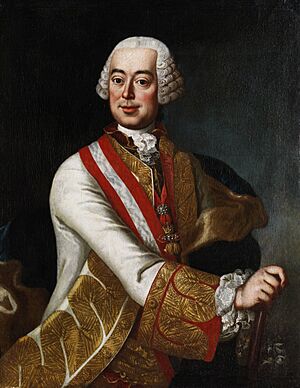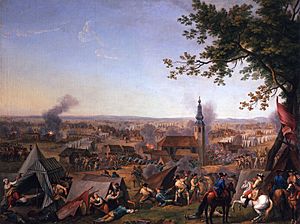Leopold Joseph von Daun facts for kids
Quick facts for kids
Leopold Joseph von Daun
|
|
|---|---|

Portrait of Daun potentially by Martin van Meytens
|
|
| Born | 24 September 1705 Vienna, Austria |
| Died | 5 February 1766 (aged 60) Vienna |
| Allegiance | |
| Service/ |
Imperial Army |
| Years of service | 1718–1766 |
| Rank | Generalfeldmarschall |
| Battles/wars |
|
| Signature |  |
Count Leopold Joseph von Daun was an important Austrian military leader. He was a field marshal in the Imperial Army. He played a key role in major conflicts like the War of the Austrian Succession and the Seven Years' War. Many people consider him one of the best military leaders of his time.
Contents
Early Life and Military Start
Leopold Joseph Maria was born in Vienna, Austria, on September 24, 1705. His family, the Dauns, were nobles from the Rhineland region. His father and grandfather were both famous generals.
Leopold was first meant to join the church. But he loved the army, just like his family. So, he decided to become a soldier. In 1718, he fought in the War of the Quadruple Alliance in Sicily. He was still very young.
He quickly moved up in rank. By 1734, he was a colonel. He fought in the War of the Polish Succession in Italy and on the Rhine. He also served in the Turkish War from 1737 to 1739. During this war, he became a major-general.
War of the Austrian Succession
The War of the Austrian Succession started in 1740. Daun showed his great skill as a careful leader. This carefulness became his most important military quality.
He fought against Prussia in the First Silesian War. He was at the battles of Chotusitz and Prague. He also led the front part of General Khevenhüller's army in 1743. Later, Field Marshal Count Traun also thought highly of Daun.
Daun held important positions in the battles of Hohenfriedberg and Soor in 1745. That same year, he was promoted to lieutenant general. After this, he served in the Low Countries. He was also at the Battle of Val. Empress Maria Theresa greatly respected him. She made him commander of Vienna. In 1754, he became a field marshal.
Seven Years' War
Before the Seven Years' War began, Daun worked on improving the Austrian army. He helped create the Theresian Military Academy in 1751. This academy trained new officers.
When the Third Silesian War started, Daun was not in command at first. But in 1757, he led the army sent to help Prague. On June 18, 1757, Daun won a major victory. He defeated Frederick the Great for the first time at the Battle of Kolín. This was a very difficult battle.
To celebrate this success, Empress Maria Theresa created a new military award. It was called the Military Order of Maria Theresa. Daun was the first person to receive its highest honor. After this, Daun became second in command. He helped chase the Prussians and win the Battle of Breslau.
Frederick the Great then won a huge victory at Leuthen. Daun was there, but he was not blamed for the loss. When Prince Charles left his command, Daun took over.
In 1758, Daun began a war of careful movements. He was very steady and calm against Frederick's fast attacks. In 1758, one of Daun's generals, Laudon, forced Frederick to stop attacking Olmütz. Later that year, Daun surprised Frederick at the Battle of Hochkirch on October 14. He caused a big defeat for the Prussians. Even though he won, Daun did not chase Frederick. This allowed the Prussians to block his path into Silesia.
The war of careful movements continued in 1759. On November 20 and 21, Daun surrounded a whole Prussian army at Maxen. He forced them to surrender.
However, in 1760, Daun's general Laudon lost at Liegnitz. Some blamed Daun for being too slow. Daun himself was later defeated at the Battle of Torgau. He was badly wounded in this battle and had to return to Vienna. But Daun's forces still caused many losses for the Prussians. They were also able to retreat in good order.
Family Life
Leopold Joseph von Daun was married to Countess Maria Josepha Fuchs vom Bimbach und Dornheim. They had two children:
- Countess Maria Theresia von Daun (1745–1777)
- Count Franz Karl von Daun (1746–1771)
Images for kids
 | William L. Dawson |
 | W. E. B. Du Bois |
 | Harry Belafonte |



